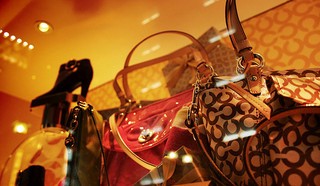Poverty, Presentability, and Expensive Handbags

Tressie McMillan Cottom is a writer, activist and graduate fellow at the Center for Poverty Research at UC-Davis whose essay “The Logic of Stupid Poor People” (h/t ftrain) confronts the common criticism of poor people spending money on things like clothes or expensive handbags when they can’t afford them:
Why do poor people make stupid, illogical decisions to buy status symbols? For the same reason all but only the most wealthy buy status symbols, I suppose. We want to belong. And, not just for the psychic rewards, but belonging to one group at the right time can mean the difference between unemployment and employment, a good job as opposed to a bad job, housing or a shelter, and so on. Someone mentioned on twitter that poor people can be presentable with affordable options from Kmart. But the issue is not about being presentable. Presentable is the bare minimum of social civility. It means being clean, not smelling, wearing shirts and shoes for service and the like. Presentable as a sufficient condition for gainful, dignified work or successful social interactions is a privilege. It’s the aging white hippie who can cut the ponytail of his youthful rebellion and walk into senior management while aging black panthers can never completely outrun the effects of stigmatization against which they were courting a revolution. Presentable is relative and, like life, it ain’t fair.
She talks about the hard to measure but undeniable advantages of growing up black in a rural area but with a modest income, nice clothes and Queen’s English, and shares ways people have responded (often shamelessly!) to these signifiers, offering her jobs or promotions based on her clean car (!) or the brand name of her suit.
I wish I could quote the whole thing here, or else turn the Billfold into the Tressie-fold and make all posts for today just paragraphs from this essay. Barring that, there is my recommendation to go read her piece, and think twice about the kind of rationalizing and distancing we do out of fear in all kinds of situations. Or, as Cottom puts it:
At the heart of these incredulous statements about the poor decisions poor people make is a belief that we would never be like them. We would know better. We would know to save our money, eschew status symbols, cut coupons, practice puritanical sacrifice to amass a million dollars…What we forget, if we ever know, is that what we know now about status and wealth creation and sacrifice are predicated on who we are, i.e. not poor. If you change the conditions of your not-poor status, you change everything you know as a result of being a not-poor. You have no idea what you would do if you were poor until you are poor. And not intermittently poor or formerly not-poor, but born poor, expected to be poor and treated by bureaucracies, gatekeepers and well-meaning respectability authorities as inherently poor. Then, and only then, will you understand the relative value of a ridiculous status symbol to someone who intuits that they cannot afford to not have it.
Photo: allured
Support The Billfold
The Billfold continues to exist thanks to support from our readers. Help us continue to do our work by making a monthly pledge on Patreon or a one-time-only contribution through PayPal.
Comments